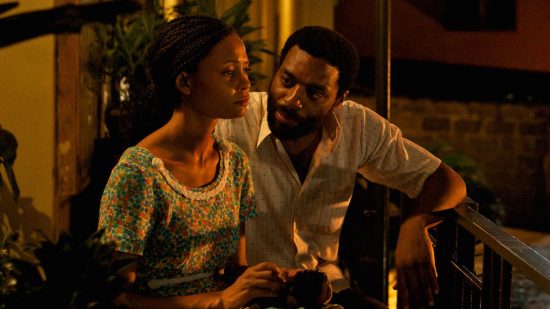57th BFI London Film Festival Review: Half of a Yellow Sun
Half of a Yellow Sun is a technicolour treat bringing a much-loved book to life on screen. The bones of the story are essentially the same as Chimamanda Ngozi Adichie’s Nigerian chronicle, and although the facts are not told in the same way (the film does not use any narration to tell its story and is much more linear than the book), it still makes a heavy impact.
Some films purely entertain, but Half of a Yellow Sun serves to do just that and provide a much-needed window into the problems and violent solutions of a politically-unrested Nigeria of 1960. It’s a film that transports the viewer to a different life, from the costumes to the customs and the language.
Half of a Yellow Sun follows the fortunes of twin sisters Olaine (Thandie Newton) and Kainene (Anika Noni Rose) who come from a well-heeled Nigerian family, recording their differing choices in love and business, as well as showing their varying political loyalties when unrest in Nigeria leads to the establishment of a new independent republic.
The sisters are both initially career-focused, with Olaine becoming a teacher while Kainene manages the family export business. Then, as they make different choices in matters of the heart – with Olaine falling for Nigerian, politically-minded professor Odenigbo (Chiwetel Ejiofor) and Kainene starting an affair with white British writer Richard (Joseph Mawle) – they are pushed together and forced apart as an allegory for the disintegration of a fragile political state.
Director Biyi Bandele also adapted the screenplay and as a novelist himself, has done a sterling job. In fact his adaptation is clearer than his direction, which sometimes left me confused. There’s a lot to pack in and clever little cinematographic tips and tricks keep this film firmly in its decade. It is obviously important that this kind of story – one based on fact – is told in a legitimate manner, and it looks so sumptuous that Bandele may have forgotten that references may be lost on his audiences, as the plot winds its way through years of unrest and upheaval.
All talk this year in the film industry has been of Chiwetel Ejiofor – he rarely makes a misstep in his choices and he does not disappoint here. Odenigbo is a complicated character with many flaws yet he is made humane by Ejiofor’s skill. It’s as much a joy to watch him as the narrow-minded ‘revolutionary’ here, as it is in any of his higher profile roles.
But this movie centres itself around two amazing female performances. Thandie Newton can play an entitled twenty year old with as much believability as the same character twenty years later. Noni Rose meets her in every scene, showing two actresses at the top of their game in their most-rounded roles to date. Mawle is good too, as another character who is intelligently drawn, but not without sin – and his noble performance is necessary in a film that strikes so many difficult blows.
It is a shame that John Boyega is not given nearly enough to work with as Ugwu, but he’s a relaxing and sweet presence on camera. Ugwu is no longer afforded the role of storyteller, meaning his voice – so vibrant within the book – does not have the same clarity here.
There are plenty of shocking moments within Half of a Yellow Sun which are delicately portrayed. It is frightening to conceive that events like ritual slaughter and rape were commonplace during this time period. The stresses and strains of relationships are mirrored against the warfare of the Nigerian state with the southern secondary state – Biafra, providing the required historical context, elevating this from just another melodrama. The film also serves partly as morality tale, with thoughtful insights into the nature of fidelity and family. Every character has to make a sacrifice, but they all retain their essential characteristics for the duration.
Bandele has captured a good story and made a dramatic film with effortless flashes of colour that punctuates the abject horror of Nigeria’s past. Regardless of the small faults in direction, Half of a Yellow Sun is a film that demands to be seen.










